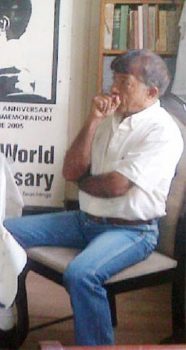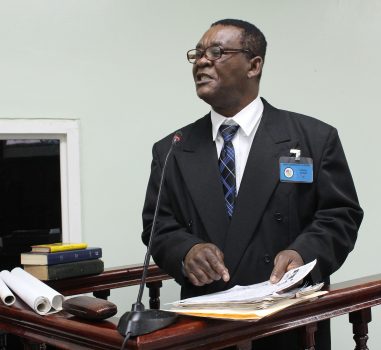Two witnesses appearing yesterday before the commission of inquiry (CoI) into land matters, pointed to the lack of action by the relevant agencies when it comes to the removal of squatters.
During yesterday’s hearing of the inquiry, which is being held at the Guyana Lands and Surveys Commission, the commission first heard evidence from Rishi Thakur, a lecturer at the University of Guyana’s Berbice campus, and later from Garfield Aaron, who identified himself as a private investigator and a former detective of the Guyana Police Force.
Though both far removed—Thakur representing the interests of the #67 and #68 villages rates and taxpayers’ association, located in the Corentyne, Berbice; and Aaron representing the interests of the descendants of a foreparent who reportedly purchased the Friendship plantation on the East Bank of Demerara—they both raised similar concerns regarding the actions of the agencies who are tasked with managing these lands.
Thakur explained that the Association is currently contesting rights to 25 acres of land located between the two villages; a low-lying area now enclosed by a sea dam.
He related that the dam was at first constructed to only enclose three acres, but when the structure proved to be inadequate in its defence, it was extended to cover 25 acres of land, which included some village lands.
Thakur said that the original owners claimed that the land had been their property since the 1900s, and that the government owned no land in either of the villages.
Although the land was managed by the Sea Defence Board after the dam’s construction, Thakur related that after villagers made representation for ownership, the agency (Sea Defence Board) wrote to the Guyana Lands and Surveys Commission (GLSC) recommending that the lands be transferred to the “original proprietors, and/or, heirs.”
“And we are of the view that those persons are us,” the witness stated, going on to divulge that it was subsequent to this that the issue of squatting began.
No intervention

Thakur noted that while many agencies speak about squatting, no intervention is made. He related that it so became an issue that at one point villagers took matters into their own hands and chased the squatters, resulting in a confrontation between the two groups. He said it was then the “minister” came and spoke to them.
He stated that it was then that they began to treat the matter with urgency, relating that there now seemed to be an “organized effort to occupy the lands.”
Thakur said that he was in possession of evidence that agencies authorized the illegal occupation of the lands, and that public officials had given the go-ahead. He stated that even with a sign placed on the land, persons still proceeded to illegally occupy it.
“There is a big sign there…to indicate squatters will be prosecuted. But where’s the prosecution? Right in front of the sign one gentleman came and occupied about three acres of land…and that has been our frustration— the unwillingness and inability of public agencies to act on what we consider to be both the spirit and the letter of the law. Because the land in our view has always remained ours,” he stated.
Thakur said that there appears to be no coordination between agencies, and questioned how squatting is still taking place when agencies claim to be intolerant of it.
“…Lands and surveys is telling us they’ll be no squatting, so why is there squatting? In every other instance we know if we commit a crime against the law, you can’t appeal. “Sorry sir, I didn’t know”. You tell the policeman that and see what will happen to you. This is the only instance where we’re being told, oh well we can’t do anything about it. So why isn’t that illegal as well and equally punishable?” Thakur questioned, adding that the Association is asking for “nothing more than an application of the law.”
“So because of these blunders, strangers from all walks of life went into our estate and started to squat and do all manners of things,” Aaron told the commission, while noting that there were several attempts by persons to claim title to the land at Friendship fraudulently.
“They even made applications to the land court and in those applications the grounds on which they based their claims are based on the grounds of fraud. They went the distance to call our lands state lands…so my predecessors were unable to clear that hurdle over the years,” the witness continued.

Aaron testified that such would not be the case if the relevant authorities had acted in accordance with the statute governing the land registry act, which he related states that the deeds registry record should be checked to see if there are titles attached to the lands.
Furthermore, he said that the statute also makes it clear that the commissioner of titles can “secure the rights of absent land owners,” which he said was also not done.
Their remedy for dealing with the squatting has been to engage rangers to police the estates ever so often.
Aaron, however, made mention that a squatter who presented a transport for a parcel of land at Plantation Friendship had gained rights to it after they settled the issue.
Asked what he hopes to get out of the commission, Aaron said he would like the commissioners to recommend that any transports/titles that were issued subsequent to the aforementioned settlement be taken to court to be disputed so that the heirs to the Friendship plantation can make claims for their ancestry rights.
In addition to this, Aaron also complained of land being taken by the state to build a lands registry office.
“The injustice just keeps going on and on,” Aaron said in relation to the matter.
He related that the president at the time had declared the portion of land set aside for the registry, but noted that the lands were not crown lands.
He said that it was unfair because they had a transport to rely on, and stated that it is “imperative” that they be given title to the land so they can “better protect” their “ancestry interests”.
Aaron’s presentation to the commission provided historical backing in regards to the purchase of plantations by African slaves, and the decision to have them later declared villages.
He related how freed African slaves had bought more than 100 plantations, including Friendship, from their masters, and said that those plantations were later converted to villages “against their will” as the result of an ordinance.
Asked by commission counsel Darren Wade why he believed it was against their will, Aaron explained that with the change from plantation to village, there was also a change in the power structure.
The witness stated that the freed slaves, after the purchase of the plantations, had set up their own drainage and irrigation systems, built bridges and managed the kokers, and even set up a system for collecting rates and taxes. But after the plantations were declared villages, a Chairman was appointed, and it was he who would take control of those matters of management.
“No one else had the right to come after to declare what you must do with your private property of a private nature. At that time they were the poor and powerless people who just come out of slavery, hadn’t any legal representation or no one to turn to for help,” Aaron stated.
He noted that while those plantations gained village status, the villages owned by the Europeans did not.
“Please take note: The board of villages did not declare the plantations owned by Bookers and other Europeans to be villages. Those plantations have remained plantations or estates to this day, such as: Ogle, Enmore, LBI, Houston, Blairmont, Leonora, etc,” the witness related.
He further stated that the village councils dispossessed many freed Africans of their transported lands, as is evident by the fact that a number of original transports cannot be located.
Meanwhile, Thakur, making what he referred to as “preliminary comments” before his testimony, dismissed comments in the press that the CoI may be on a “hunting trip.”
“…it has been floated in the press that this commission may be on a hunting trip or a fishing trip. We are not of that view. And we take umbrage to the fact that someone would want to deny us the right to speak to this commission because we have been after this matter now for the better part of nine years,” Thakur commented.
“…how is it that speaking to the rights of one community automatically deny the rights of another? I don’t know how or where that would happen…affirmative action is a necessary part of any process that claims to be free, fair and honest. Because we need to correct historical wrongs. And if that is the only thing we’re doing here today, or only speaking to it, I want to make sure that we understand that.”
The CoI’s mandate is to examine and make recommendations to resolve all the issues and uncertainties surrounding the individual joint or communal ownership of land acquired by freed African; claims of Amerindian land titling and other matters relative to land titling.
It is being chaired by Reverend George Chuck-a-Sang, with Khan-James, David James, Professor Rudolph James, Lennox Caleb, Berlinda Persaud, and Paulette Henry serving as commissioners.





